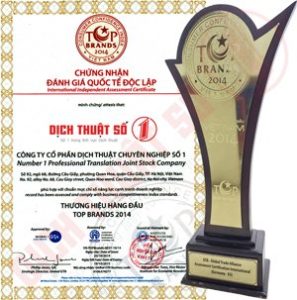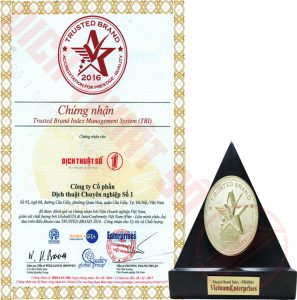Through practical experience in the translation profession as well as teaching foreign languages in general and translation (English - Vietnamese / Vietnamese - English) in particular, and through consulting some professional ethics / codes of conduct in other countries for the translation profession, we have found that when selecting translation students and translation training programs, we need to pay attention to the following criteria and skills:
First criterion (1): Memory ability
Interpretation is often divided into two main types: consecutive interpretation, in which the speaker says a sentence, a paragraph or an idea and then stops so that the interpreter can translate it into the target language; and simultaneous interpretation, in which the speaker and the interpreter present (almost) at the same time. In both types, the interpreter's ability to remember is very important, especially in the first type. Without the ability to remember, even in "short-term memory", the interpreter will not be able to fully convey the speaker's ideas. To be able to remember, the interpreter needs to be trained to analyze, synthesize and arrange the information heard in a certain logic and structure, because it is never possible to listen to and remember every word of the speaker. One must "catch the thread" of the speaker's ideas. Thus, closely related to the ability to remember is the ability to guess the meaning, grasp the spirit of the speaker's message and predict the next information the speaker will present based on what has been received. Of course, all of this depends on the interpreter's listening comprehension, both in the foreign language and in the native language.
For students, not all students are good at listening and remembering. Even many foreign language teachers have very good foreign language listening and understanding skills but do not have good memories, so they cannot be interpreters. In addition, not all students can be trained in memory. Therefore, the first criterion in selecting student interpreters must be their memory ability.
To select the “right people” for training, there needs to be a test of this ability, which can be just a short piece of information in Vietnamese of a few sentences and ask them to convey it. Later, during the training process, they will have to be trained continuously. At first, it can be just simple listening exercises, short in length of about 100-200 words and students are required to present it, both orally and in writing. This is the method that we were trained in right from the first semester of our first year of university majoring in English: students listen to a short funny story (usually taken from the book Stories for Reproduction by LA Hill), then retell it to each other, add missing details to each other, edit each other, or rewrite it and then exchange with each other to correct or submit it to the teacher for grading. At that time, we could not fully understand the effect of this type of exercise, but later when we became interpreters, we realized how effective they were in training listening comprehension, memorization and reproduction skills from the smallest things. In fact, many foreign language teachers today mainly train students in some basic listening skills such as listening to fill in information on tables, listening to determine correct/incorrect information, listening and following certain instructions or answering a few short questions. They pay little attention to making students reproduce what they hear. For listening comprehension skills in foreign language teaching using the communicative method, this may be enough (mainly receptive skills). However, in interpreter training, reproduction is an important skill that needs to be practiced regularly.
Second criterion: Pronunciation, voice
Interpreters are required to have a good voice, standard pronunciation, and "clear and round words", both in their native language and in a foreign language, because they have to speak to many, many people. In Vietnamese, it is necessary to select students who have clear pronunciation, no lisp, and a loud enough voice, because there are many cases where interpreters have to translate without the help of audio equipment. In English, during the training process, it is necessary to train students to pronounce each sound and each word accurately, then stress, intonation, and especially practice expressive intonation. Insensitive speech will be very boring and heavy for the listener, because in many conferences the atmosphere is often heavy with long, dry, one-sided reports, one report after another. Interpreters need to speak in a lively, emotional, and pleasant way for the listener, but of course, they should not over-act, failing to faithfully express the spirit and attitude of the speaker.
During the training process, it is necessary to choose a unified pronunciation to train students: either British English, American English, or Australian English (all must be standard languages), because in reality, every language has many dialects and not all dialects are easy to understand, as we can see right in Vietnamese. Standard pronunciation is much more important than grammar and vocabulary: people can make mistakes in grammar, use non-standard words but the listener can still understand more or less, but pronouncing a into b, b into c is very easy to make the listener not understand, or misunderstand. We have had to translate for speakers many times and had to work very hard to "guess" what they were saying, simply because of their pronunciation (for example, some Indians, Sri Lankans, Japanese, and even some Vietnamese people do not speak English well).
Third criterion: Professional qualifications (foreign languages and related majors)
Interpreters need many types of knowledge: language, culture, general or background knowledge and specialized knowledge. They need to be fluent, have a rich vocabulary, have a thorough understanding of the linguistic issues of both languages, understand the similarities and differences between the two languages not only in grammar but also in semantics and pragmatics. Such understanding is closely linked to cultural knowledge about the country, people, lifestyle, habits, customs and practices of the two language communities. In turn, cultural knowledge must be based on a solid and constantly updated encyclopedic knowledge base. Finally, each field has its own terminology, expressions, and styles, requiring translators to understand at least their meaning and connotation, although not as deeply as a specialist. Therefore, translation students need to be trained in depth about Vietnamese language and Vietnamese history and culture as well as similar issues of the country where they are studying the foreign language. At the same time, it is necessary to equip them with specialized knowledge in which they will have to work in the future, at least the most basic and fundamental knowledge of that major. Of course, it is difficult to mention many majors, so it is necessary to choose basic majors with high demand for use to teach.
When selecting, it is also necessary to check the students' background knowledge, the knowledge they have learned in previous levels to see how much they have grasped, from there have a plan to foster and supplement in the interpreter training program.
Fourth criterion: Presentation skills and public speaking ability
Having attended many conferences and observed speakers in some television programs such as SV96 or competitions in which contestants have to compete in eloquence, we have realized that the public speaking ability of many Vietnamese people in general is still weak and presentation skills have not been formally and systematically trained at all levels of education, including university and postgraduate levels. For interpreters, especially consecutive interpreters for training courses, presentation skills and speaking ability are extremely important because the interpreter's responsibility at that time is not only to convey the speaker's words but also to express the ideas, highlights, attitudes, and views that the speaker wants to present. All must be expressed immediately, in front of a large audience, exactly as the speaker did. In other words, the interpreter must be a "prototype" copy of the speaker. Therefore, it is necessary to pay special attention to training presentation skills and speaking ability for translation students. These skills and abilities are closely linked to the training of memory and logical thinking mentioned in the first criterion above.
Fifth criterion: Agility
Similar to the fourth criterion, also closely related to the first criterion of memory and logical thinking is the agility required of an interpreter. An interpreter needs to quickly grasp the content of the ideas that the speaker wants to present, quickly learn and remember the words, terms, and idioms that the speaker uses, especially specialized words in specific contexts of use that often cannot be found in the dictionary.
Due to time pressure, errors or mistakes in the translation process are inevitable, but the interpreter needs to quickly detect any omissions, defects or inaccuracies in order to promptly correct and supplement them in the following translations, minimizing misunderstandings and distortions of the information conveyed by the speaker.
The interpreter's agility is also demonstrated in knowing how to choose words and styles appropriate to the context of use and the audience. A word/phrase in one language may have many similar words/phrases (but not necessarily equivalent) in another language and vice versa, so it is very important for the interpreter to make the right choice, and this choice must be made under great time pressure. Let me recount an experience: recently we accompanied a delegation of officials from the Ministry of Natural Resources and Environment to visit Imperial College in London. When we first arrived, the Director of the Environmental Research Center of Imperial College (perhaps not knowing the composition of the delegation at that time) dressed "smart casual" and greeted them with a polite style and a fairly simple, everyday sentence structure and language. However, after being introduced to the members of the delegation and the Head of the delegation, the Deputy Minister of Natural Resources and Environment, he immediately apologized and returned 5 minutes later in full attire (suit, tie), formal, and from then until the end of the meeting, he used quite polished sentence structures, polished language with a "very diplomatic" style (roughly speaking, he used "posh" - highly formal language) but was also very open, enthusiastic and sincere. We had to work very hard to find a way to recreate the language style of this Director so that it was true to the spirit and respectful attitude that he intended to express explicitly towards the Vietnamese delegation. Through this experience, we see that in the training process, it is necessary to focus on helping students distinguish between language styles, registers and know how to choose and use appropriate words for each style and register in the necessary context.
Cultural sensitivity is also an important aspect of the “quickness” criterion of an interpreter. As many translators have emphasized, an interpreter must be a cultural bridge between people who speak different languages. Lacking knowledge and cultural sensitivity, an interpreter will find it difficult to complete his task, or may lead to unfortunate problems. Here is an example (with sincere apologies to the readers as well as the person whose name is as follows): a word in one language may coincide with a “taboo” or “vulgar” word in another language and vice versa, such as the name Can in Vietnamese. When we have to introduce a person named Le Van Can, we have to read it a little differently in English, such as Can (in I can speak English). In another case, the foreign speaker made a mistake and repeated that This project was implemented in 2 provinces of Nha Trang and Khanh Hoa while in reality it should be Phu Yen and Khanh Hoa, because Nha Trang is a city in Khanh Hoa province, not a separate province. That case forced the interpreter to be sensitive and correct the speaker's mistake to match the reality.
There are many other cases that require interpreters to be quick and responsive. We just want to emphasize that in selecting student interpreters, it is necessary to discover and select the right students with this ability, or at least with potential “trainability” to ensure the success of interpreter training, and to focus on training and strengthening this ability of theirs during the training process.
Shorthand skills
Although an interpreter must have a good memory, while listening, it is also necessary to take notes of important words and key points to help organize ideas and reproduce the speaker's presentation smoothly and completely. During the interpreting process, we found that listening, understanding, remembering and translating numbers from English to Vietnamese and vice versa is not an easy task. In particular, there are numbers that are expressed in very different ways in the two languages, for example: in 1900, Vietnamese says one thousand nine hundred while English often says nineteen hundred; or fifty hundred students attended the meeting while Vietnamese says one thousand and fifty/one thousand and five hundred students attended the meeting. On the contrary, Vietnamese often has the expression Over two hundred thousand Chiang Kai-sek troops drew into the North of Vietnam while English has to use the word hundreds – Over two hundred thousand Chiang Kai-sek troops drew into the North of Vietnam – Over two hundred thousand Chiang Kai-sek troops drew into the North of Vietnam. The difference in numbers between Vietnamese and English: one side is one thousand five hundred, the other side is fifteen hundred; one side is two hundred thousand, the other side is two hundred thousand has often made us very confused. While listening, we have to quickly write down not only numbers but also words and arguments – that requires the interpreter to have shorthand skills (stenography). Thus, it is very necessary to include shorthand skills as a subject in the interpreter training program.
Professional Ethics Training
Every profession has its own professional ethics or code of conduct. The same goes for the interpreting profession. Currently, there are quite a few sets of interpreting ethics such as the standards of the Immigration and Refugee Board of Canada, CALS (Community access and language service) of the UK, the Northern Ireland Council for Ethnic Minorities, the Washington State Court of the United States, etc.
In the above documents, there are many requirements and rules that interpreters must comply with. In short, these ethical standards/codes of conduct focus on the interpreter's loyalty to the text and ideas, the speaker's attitude, impartiality towards the parties to the dialogue, and especially not adding comments, remarks or attitudes of the interpreter to the translation. An interpreter is an interpreter, not a party to the ongoing dialogue or debate. Sometimes we also encounter cases where the interpreter "forgets" his position, role and responsibility and stands up to debate like a delegate attending a meeting, or "bend" the speaker's words according to his own will without faithfully conveying the speaker's words. We ourselves sometimes have to "hold back" to properly perform our duties as an interpreter, even though there are many things that are very pressing or that we want to contribute. Another case: we were once invited to interpret for a project in a province, although there were professional interpreters in that province. The reason was simply that in some previous meetings, the Vietnamese and foreign sides did not understand each other, the foreign side had some words that could be called “scolding” the Vietnamese side, and the interpreter there did not translate the original because the person being “scolded” was his boss and of course he could not “dare to scold the boss” but had to stand on the boss’s side. In the end, the two sides did not reach an agreement.
The integrity and impartiality of interpreters is particularly important in court. Some of our colleagues who interpret for courts and police in the UK are required to sign a pledge stating that they are not allowed to defend a defendant, even if they are their own countrymen. They also have measures in place to control the quality of their interpretation, and if an interpreter breaches the code of professional conduct, they will be dealt with appropriately, or simply lose their job – which means losing their “bread and butter”.
During the training of interpreter students, we think it is necessary to introduce these codes of conduct/professional ethics and require students to continuously practice them if they want to truly become professional interpreters in the true sense of the word.
Above are some of our suggestions and notes for the selection and training of student interpreters. We hope that these criteria and notes will be of interest to teachers, colleagues and students who are passionate about the profession of interpreters and will apply them if they find them appropriate and useful.








